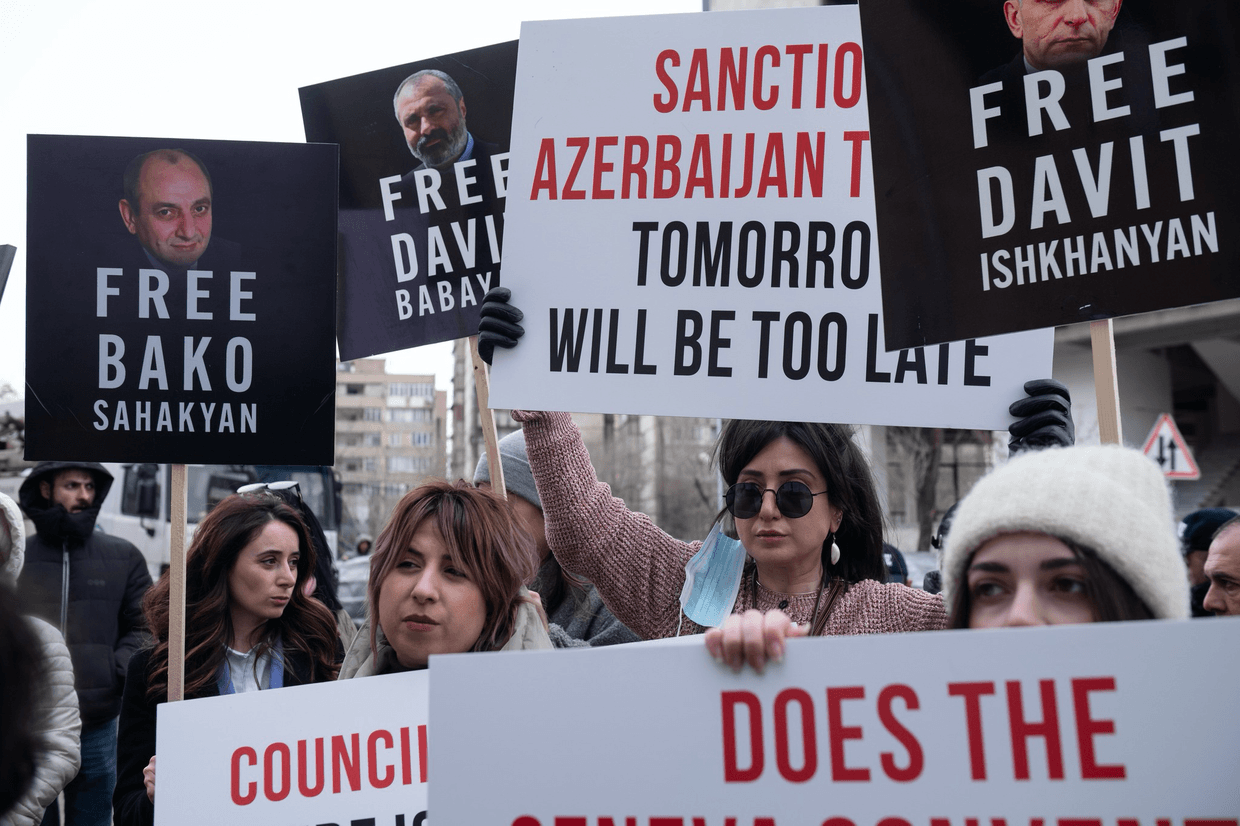
Several demonstrations have taken place in Yerevan since 28 February, calling on the government and international organisations to pressure Azerbaijan to release Armenian prisoners — including former Nagorno-Karabakh officials — being tried in Azerbaijan.
On Monday, a demonstration was held near the offices of the International Committee of the Red Cross (ICRC) in Yerevan, amidst reports that Azerbaijan sought to push the ICRC, UNDP, and UNHCR out of the country.

Previously, on 28 February, a demonstration was held near the Foreign Ministry and UN office in Yerevan.
According to Armenpress, the protesters demanded that the Armenian authorities ‘convene a meeting with accredited diplomats in Armenia to present the crimes taking place against our compatriots in Baku and demand substantial steps’.
They also noted that the Armenian authorities ‘must raise this issue on international platforms’.
At least 16 Nagorno-Karabakh Armenians, including ex-officials, are currently on trial in Azerbaijan for a total of 2,548 crimes, including genocide, slavery, enforced disappearance of persons, torture, financing of terrorism, and the creation of a criminal association. Azerbaijan has officially acknowledged that it is holding 23 Armenian prisoners.
Among those detained are three former Nagorno-Karabakh presidents — Arkadi Ghukasyan, Bako Sahakyan, and Arayik Harutyunyan — and former State Minister Ruben Vardanyan, a Russian–Armenian billionaire who is currently on hunger strike in protest against his imprisonment.

Banners held by protesters near the UN’s offices showed portraits of the Armenian prisoners, with one of them reading: ‘UN silence benefits Azerbaijan: act now before it’s too late’.
On 1 March, Mane Tandilyan, the president of Country to Live, a party affiliated with Vardanyan, began a hunger strike in Armenia’s Freedom Square, ‘as a plea’ to the former state minister to stop his hunger strike, despite her ‘fully supporting the demands underlying Ruben Vardanyan’s hunger strike’.
The following day two more people joined her in her hunger strike. Tandilyan felt ill on Monday, with EMTs telling her to terminate her strike. As of publication, Tandilyan is apparently still on hunger strike.

Tandilyan served as Armenia’s Labour and Social Affairs Minister from May to November 2018. Then, in the aftermath of the Second Nagorno-Karabakh War, she served as Labour, Social Affairs and Migration Minister of Nagorno-Karabakh from December 2020 to September 2021.
Vardanyan began his second hunger strike on 18 February in protest against his trial and arrest by Azerbaijan, following which his lawyer, Jared Genser, made a statement regarding his deteriorating health since going on strike. Genser said that the Azerbaijani military court refused their five motions to postpone the trial and ‘insisted [Vardanyan] attend, despite his being on the verge of passing out’.

Yerevan joins the fray
Armenian officials have only recently begun publicly condemning the trial of former Nagorno-Karabakh officials and other representatives of the region which was launched in January.
On Friday, Armenia’s Foreign Ministry stated that it ‘continues to draw the attention of the international community’ to the issue of the release of Armenian prisoners held in Azerbaijan. They also stated that the Azerbaijani authorities ‘are using this judicial spectacle as a tool for political pressure on’ Armenia.
In response, Azerbaijan’s Foreign Ministry ‘resolutely’ condemned and rejected Armenia’s statement. It said that the Armenians on trial ‘either have been charged or convicted with war crimes, ethnic cleansing, military aggression, torture, and other serious offences’, and that Azerbaijan was obligated to ‘investigate and prosecute these offences under the Geneva Conventions and generally under international and domestic law’.
Last week, during an official visit to Geneva, Armenian Foreign Minister Ararat Mirzoyan criticised Azerbaijan’s detention and trials against Nagorno-Karabakh Armenians — including former officials — marking the first time Armenia broached the matter at an international level.
On Saturday, Armenian Prime Minister Nikol Pashinyan said that his government made ‘possible diplomatic efforts’ towards the release of the Armenian prisoners and that they continue to ‘bring up this issue in discussions with Azerbaijan’. He also noted that ‘efforts are being made that are not immediately visible and have yet to yield results’.
Pashinyan claimed that initially they ‘refrained from making certain statements’ in regard to the trial ‘to avoid provoking torture and the use of prohibited methods’.
‘Why are we making a statement now? Because we see that we can no longer provoke anything further — it has already happened’, Pashinyan said.
In late January, Pashinyan expressed concern that the trial was ‘not only seriously worrying, but will be, and is being used to provoke new escalations in the region’.
On 27 February, Andranik Kocharyan, an MP and chair of the parliamentary Defence and Security Committee, stated that the former political and military leadership of Nagorno-Karabakh ‘did not have the right’ to be captured by Azerbaijan, adding that their detention by Azerbaijan was a threat to Armenia.

For ease of reading, we choose not to use qualifiers such as ‘de facto’, ‘unrecognised’, or ‘partially recognised’ when discussing institutions or political positions within Abkhazia, Nagorno-Karabakh, and South Ossetia. This does not imply a position on their status.










